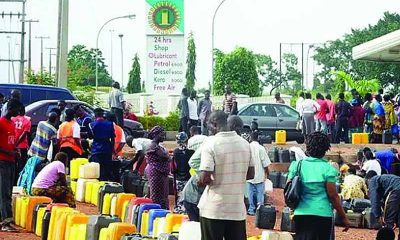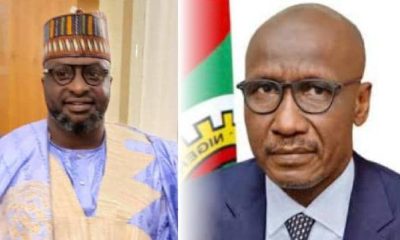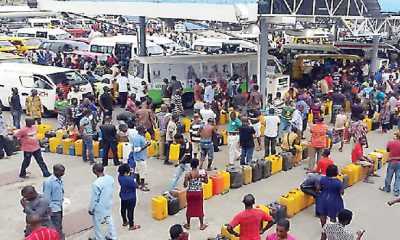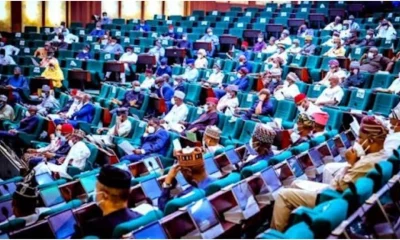News
Resolving The Unending Fuel Crises In Nigeria

By Joseph Sangosanya
Nigerians in the last few weeks have continued to witness another round of scarcity of Petroleum Motor Spirit (PMS) simply called petrol in this part of the world. The timing is not strange.
The country has in the last one decade often experience fuel scarcity between
November and January yearly. The heavy demands of the product in December as a result of the festivities often make it worse.
The scarcity this year further inflicted monumental hardship on the already depressed citizens partly because of the improved economy which prompted increased number of travellers for the yuletide.
Transport fares have doubled despite the struggling economy. This is a case of adding salt to injury for Nigerians.
The All Progressive Congress (APC) came
into power in 2015 with the “Change” slogan and Nigerians are asking today, where is the change?
The supposed change government of
President Muhammadu Buhari inherited a government deregulated petroleum sector with the subsidized pump price fix of 87 naira per litre.
Today, the change government removed the subsidy and increased the pump price to 145 naira per litre. As it stands now, the scarcity of the product has paved way for the major players in the industry to inflict more pains on Nigerians through long queues at filling stations even selling between 250-400 per litre in some places. Most people have resorted to the black market to get the product.
There have been accusations and counter accusations between the Depot and Petroleum Products Marketers Association (DAPPMA) and the ‘Almighty’ Nigerian National Petroleum Corporation (NNPC) on the causes and who was responsible for the scarcity. These accusations makes no sense to Nigerians whose interest is to get the product whenever they need it at the regulated price.
Interestingly, Nigeria is the 8th largest exporter of crude oil in the world and largest in Africa. Ironically, Nigeria is also largest importer of petroleum products in Africa. Nigeria economy still largely depends on oil and a dip in the international crude oil price does have astronomical effects on the nation’s economy.
At the inception of Buhari’s government in May 2015, the government promised to fix the three existing refineries for maximum production to meet the domestic needs with little importation if there would be need for it at all. Today, despite the several acclaimed Turn Around Maintenances (TAM) by the government, it appears that none of the refineries can produce a litre of petrol.
Since the subsidy removal, the NNPC
imports and distributes products through DAPPMA, Major Oil Marketers Association of Nigeria (MOMAN) and Independent Petroleum Marketers Association of Nigeria (IPMAN).
Several factors have been adduced to the scarcity. Among them is the increase in the landing cost; lack of sufficient supply by the NNPC; the high exchange rate; the demand for increase in pump price by the marketers; and hoarding of the product among others.
The President has outrightly rejected the call for pump price hike by the marketers. The government also claimed to be working round the clock to resolve the crises in record time.
However, past experiences have shown that an immediate, temporary solution could be on the horizon but the problem would persist because we would have successfully treated only the symptoms and not the root of the problem.
The military and paramilitary formations claimed to destroy some illegal refineries in the creeks in recent time. This p the ingenuity of Nigerians in getting hard, difficult things done. This should have served as a template for the government as Nigerians looks forward to a new oil regime.
The modular refineries promised by
Buhari government has been a mirage. Modular refineries are reasonably cost effective, easy to maintain, nearer to the end users and could be constructed and completed in good time. The current existing moribund national refineries that have gulped huge chunk of money for TAM can not take the country anywhere. These are facilities built in 70s and have outlived their usefulness and resourcefulness.
Government need to be serious with the construction of modular refineries. What sense does it make to transport fuel from Lagos to Kano or Adamawa?
This is absurd considering the distance, risks and pressure on the already dilapidated roads. Modular refineries can help to solve these problems. Let us not forget that we are no longer transporting the product through pipelines again as a result of vandalism.
In further resolving the perennial lingering oil crises, the government must be sincere and transparent enough in the running of the nation’s cash cow, Nigerian National Petroleum Corporation, NNPC.
The corporation is the most shrouded agency of the government, almost bigger than the government. It has to be transparently unbundled for effectiveness and accountability. This will not only help in resolving the oil impasse in the country but help to generate more revenue to the government.
In the same vein, the Petroleum Industry Governance Bill must be given accelerated passage in the National Assembly.
The crises between Minister of State for Petroleum Resources, Dr. Ibe Kachiku and the Group Managing Director, Nigerian National Petroleum Corporation, NNPC, Mr. Maikanti Baru must be urgently truly resolved beyond the cheerful photograph poses. There must be genuine reconciliation between the two major managers of the petroleum industry.
There have been allegations of internal sabotage within the government. This has to be investigated and culprits severely punished for act of sabotage.
Also, Department of Petroleum Resources, DPR, have to wake up to their responsibilities. The agency is one of the most docile government agencies.
They have to wake up. Moreover, hoarding of petrol, diesel and kerosene should be considered as economic sabotage.
Therefore, government should go beyond mere fines and enact law that will ensure permanent forfeiture of such product and facilities to the government.
-
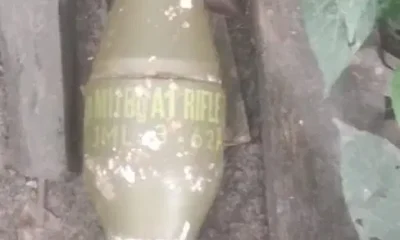
 News5 days ago
News5 days agoOver 100 Deaths Averted As Soldiers Evacuate Suspected Bomb From Church Premises In Abia
-

 News4 days ago
News4 days agoOsun Assembly Aspirant Pledges People-centred Representation For Boripe/Boluwaduro constituency
-

 News3 days ago
News3 days agoBandits Attack Kwara Communities, Kill Villagers, Burn Houses
-
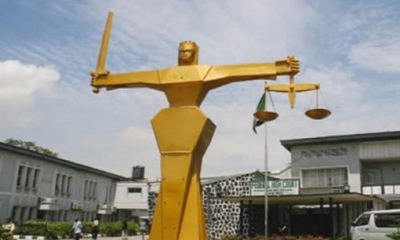
 Crime5 days ago
Crime5 days agoOsun: Court Remands Fake Herbalist Over N12.5million Fraud




